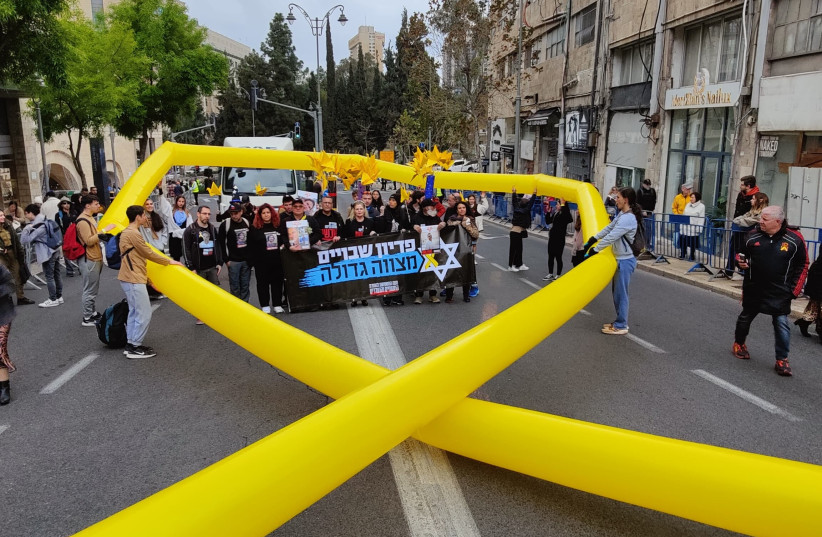As Jews around the world prepare to celebrate the holiday of Passover – marking the Exodus from Egypt, and celebrating the freedom and sovereignty of the Jewish people – we cannot avoid the context in which this holiday will be celebrated in 2024 after the October 7 massacre of Jewish people in their sovereign state.
Today, although we may be far from declaring victory over those who wish to destroy us, the celebration must go on, just as Israeli society must carry on to ensure our people and nation will continue to thrive and flourish in the day after the war, whenever that may be, while wearing a yellow ribbon.
The famous yellow ribbon, which became a universal symbol of solidarity with the Israeli hostages taken into Gaza by Hamas, must also include, in this case, fallen soldiers and their families, survivors of October 7, hundreds of thousands of evacuated residents from Israel’s North and South, reservists who stopped their lives to serve and their families who are holding down the fort at home, and businesses that lost everything. We must continue to advance civil and economic life while remembering those who were taken, those who are mourning, and those who lost their livelihood to the ravages of war. This will be our modern-day victory and will ensure that our people have a bright future ahead.
Over six months since the Hamas massacre, 134 hostages still remain in captivity, the IDF operation in Gaza is ongoing, and many evacuated civilians still don’t have a return date. With that, we have a moral obligation to ensure that Israel will not abandon decades of economic growth and a thriving civil life. If small businesses sink and the markets slow down, we’ll see Israel’s stock market drop and its credit rating downgraded, as we witnessed last month when Moody’s, the international credit agency, reduced Israel’s rating. If we truly want to be victorious, the civilian front must keep Israel’s economic engine running, and we must be resilient in times of national crises.

Hi-tech industry of prime importance to Israel's economy
The cornerstone of Israel’s economy is the hi-tech industry. This sector is what makes Israel a global economic force, the “start-up nation.” To mitigate the damage caused by the uncertainty of war, Israel’s Innovation Authority, an arm of the government working to advance the hi-tech sector, has created a wartime fund with fast-track grants for start-up companies in need of support during this time, allocating approximately NIS 100 million ($25 million) to over 100 companies struggling to raise funds.
This program enabled start-up companies to continue growing during the war, and it saved this sector from what could have been a fatal collapse. Other government bodies should adopt this model and consider the long-term effects of a slowdown in their respective fields.
AS CEO of the Menomadin Foundation, an Israel-based international impact fund, I can say that we’re practicing what we’re preaching, and we urge other funds – both in Israel and abroad – to do the same.
During the war, we’ve continued to invest in and guide the start-ups under our wing, including companies such as Biobeat, which has developed a remote monitoring system for patients’ vital signs that is being used on soldiers in Gaza today; the Israeli med-tech company EyeControl, which uses a headset to reduce delirium in ICU patients, including those injured in the Israel-Hamas war; and ifeel, a digital platform enabling companies to offer employees access to mental health counseling, which has been used to treat civilians with PTSD and moderate forms of trauma since October 7 and has expanded its activity to treat families of reservists serving on the frontlines.
To me, strengthening Israel through investment in the “Start-Up Nation” is part of fulfilling the Zionist vision.
In addition to securing Israel’s hi-tech sector, the second thing the Jewish Nation must focus on is personal resilience. The Hamas massacre of Israelis on October 7 left the nation traumatized, and the military campaign in Gaza has taken its toll on soldiers and their families. When trauma turns into post-trauma, it’s a lot harder and more expensive to treat. The sooner Israel attends to those who are deeply emotionally affected by the consequences of the war and its aftermath, the better.
I believe that investing in prevention versus treatment should be a national policy, and it will save Israel millions in the long term. For example, the IDF has made it a policy that every brigade leaving Gaza, either for good or for a short visit home, has to complete psychiatric treatment with a professional before being released. This enables the soldiers to unpack and reflect on the horrors they’ve witnessed in battle. It forces troops to unload trauma and reduces the risk of developing shell shock down the line.
Finally, strengthening the South is another fundamental factor of Israel’s rehabilitation process as we near the “day after.” As Israel’s founding father and first prime minister, David Ben-Gurion, said: “It is in the Negev where the creativity and pioneering vigor of Israel shall be tested.” Civilians must return home to a safe and secure environment with new opportunities for growth and personal development. This, of course, also includes those who were evacuated from the northern region, as Hezbollah intensifies its attacks on border communities.
Ensuring Israel’s social and economic resilience during challenging times is a national effort, and we must stand strong in the face of uncertainty for the sake of our future.
The writer is the CEO of the Menomadin Foundation, an international Israeli-based impact fund that promotes innovative solutions to sustainable development challenges in Israel and Africa, in a model that combines strategic philanthropy and impact investments. In her previous position, she served as vice president for development at Bar-Ilan University.
